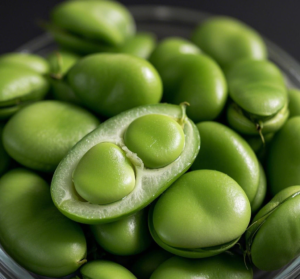Broad beans, also known as fava beans (Vicia faba), are large, flat legumes widely used in Mediterranean, Middle Eastern, and Asian cuisines. These green or brownish beans are packed with nutrients and have been a dietary staple for thousands of years. But is broad bean healthy? Let’s dive into their nutrition and health benefits.
A 100-gram serving of cooked broad beans contains:
- Calories: 112
- Protein: 8.8g (18% DV)
- Fiber: 6.2g (25% DV)
- Carbs: 19.4g
- Fat: 0.4g
- Vitamins & Minerals: Iron (21% DV), Folate (24% DV), Magnesium (12% DV), Potassium (11% DV), and Vitamins B6, C, and K.
Key Takeaway: Broad beans are a low-fat, high-protein, high-fiber food—ideal for balanced diets.
Broad beans are rich in soluble fiber and luteolin (an antioxidant), which help lower LDL cholesterol and reduce artery inflammation. A 2020 study in Nutrients found legume consumption linked to a 10% lower risk of cardiovascular disease.
Keyword Use: Are broad beans good for heart health? Yes, thanks to their fiber and antioxidant content.
The low glycemic index (GI 30) and high fiber of broad beans slow glucose absorption, making them suitable for diabetics. Research in Diabetes Care notes legumes can improve insulin sensitivity.
With 6.2g fiber per 100g, broad beans promote gut regularity and feed beneficial gut bacteria. Their prebiotic properties may reduce constipation and support a healthy microbiome.
As a complete protein source (containing all 9 essential amino acids), broad beans are vital for muscle synthesis. Pair them with rice or quinoa for a vegan-friendly protein boost.
Folate (Vitamin B9) in broad beans is crucial for DNA synthesis and red blood cell formation. Pregnant women benefit greatly from its role in fetal development.
Iron and B vitamins in broad beans combat fatigue by improving oxygen transport (iron) and energy metabolism (B6).
Compounds like phytic acid and flavonoids in broad beans exhibit anti-cancer properties, according to studies in Journal of Agricultural and Food Chemistry.
While is broad bean healthy has a resounding “yes,” consider these caveats:
- G6PD Deficiency: Avoid raw broad beans if you have this genetic condition (linked to hemolytic anemia).
- Purines: High purine content may trigger gout in sensitive individuals.
- Digestive Issues: Soak or ferment beans to reduce oligosaccharides (which cause gas).
Incorporate broad beans into your diet with these ideas:
- Fresh: Steam or boil young beans for salads or dips.
- Dried: Use in stews, curries, or sprouted for extra nutrition.
- Recipe Ideas:
- Fava Bean Hummus
- Broad Bean Risotto
- Mediterranean Bean Salad
Yes! Broad beans are a nutritional powerhouse packed with protein, fiber, and essential vitamins. Whether you’re a vegan, athlete, or health-conscious eater, these versatile legumes deserve a place in your pantry.
Final Keyword Push: Health benefits of broad beans include heart support, blood sugar control, and digestive wellness—making them a must-try ingredient.
